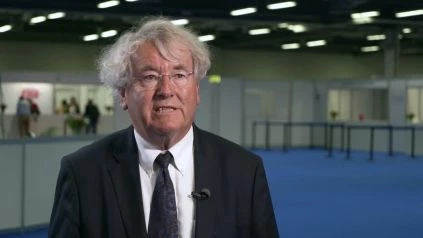Chemotherapy is ineffective against a certain subset of diffuse large B-cell lymphoma (DLBCL) types. In this video, recorded at the 23rd Congress of the European Hematology Association (EHA) 2018, held in Stockholm, Sweden, Christian Gisselbrecht, MD, of the Hôpital Saint Louis, Paris, France, discusses how the standard of care for DLBCL can be improved through the identification of high-risk patients. He describes how poor prognosis subtypes, like germinal center B-cell like (GCB) DLBCL, can be identified with immunophenotyping, and how adverse BCL-2 rearrangements can be identified in these patients with a FISH test. Identifying GCB DLBCL with BCL-2 rearrangements allows treatment plans to be specialized: in young patients, intensive treatment similar to that for Burkitt’s lymphoma is recommended, while older patients can receive further screening during treatment and start salvage therapy with autologous stem cell transplant if relapse is likely.
[the_ad id="32629"]

